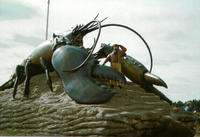
The signs are encouraging that lobsters are growing in greater numbers in Long Island Sound, but state officials say they remain uncertain if the massive lobster die-off of 1998 has run its course. For the sake of those who make their living from the fisheries of Long Island Sound and those consumers who enjoy feasting on the king of crustaceans, let's look at the more positive anecdotal evidence and trust a recovery is under way.
Revival of the state lobster industry is vital to the marine economy of the Sound, which, of course, is a significant piece of the state's economy that mustn't be lost. Connecticut waters once yielded the second largest lobster production in the nation, but the industry was crippled nearly to extinction in 1998 by a sudden and rapid die-off. State Department of Environmental Protection officials say consensus about the cause of the die-off now leans toward years of above-normal temperatures in Sound waters.
However, lobstermen still tend to favor a theory that the die-off was caused by pesticides used by the state in coastal communities to fight mosquitoes carrying the West Nile virus. Science will eventually narrow the die-off cause, but the encouraging development is in the anecdotal evidence.
Lobstermen are working the waters once again in greater numbers and they report they are finding more keeper-sized lobsters in their traps. In addition, the lobstermen say their traps are filling once again with nuisance spider crabs, a species very sensitive to low oxygen levels in the water. Such crabs had all but disappeared from Sound waters right before the lobster die-off. Another encouraging sign is that lobster fishing equipment sales have steadily rebounded.
Lobster stocks may still be depressed — just see how many restaurants in the state feature Connecticut lobsters — but the signs above offer hope, especially since it takes six full seasons for a lobster to become an adult. In the meantime, state officials must continue to press for conclusive evidence on the cause of the 1998 die-off and possible actions that can be taken now to avert a similar disaster in the future.
No comments:
Post a Comment